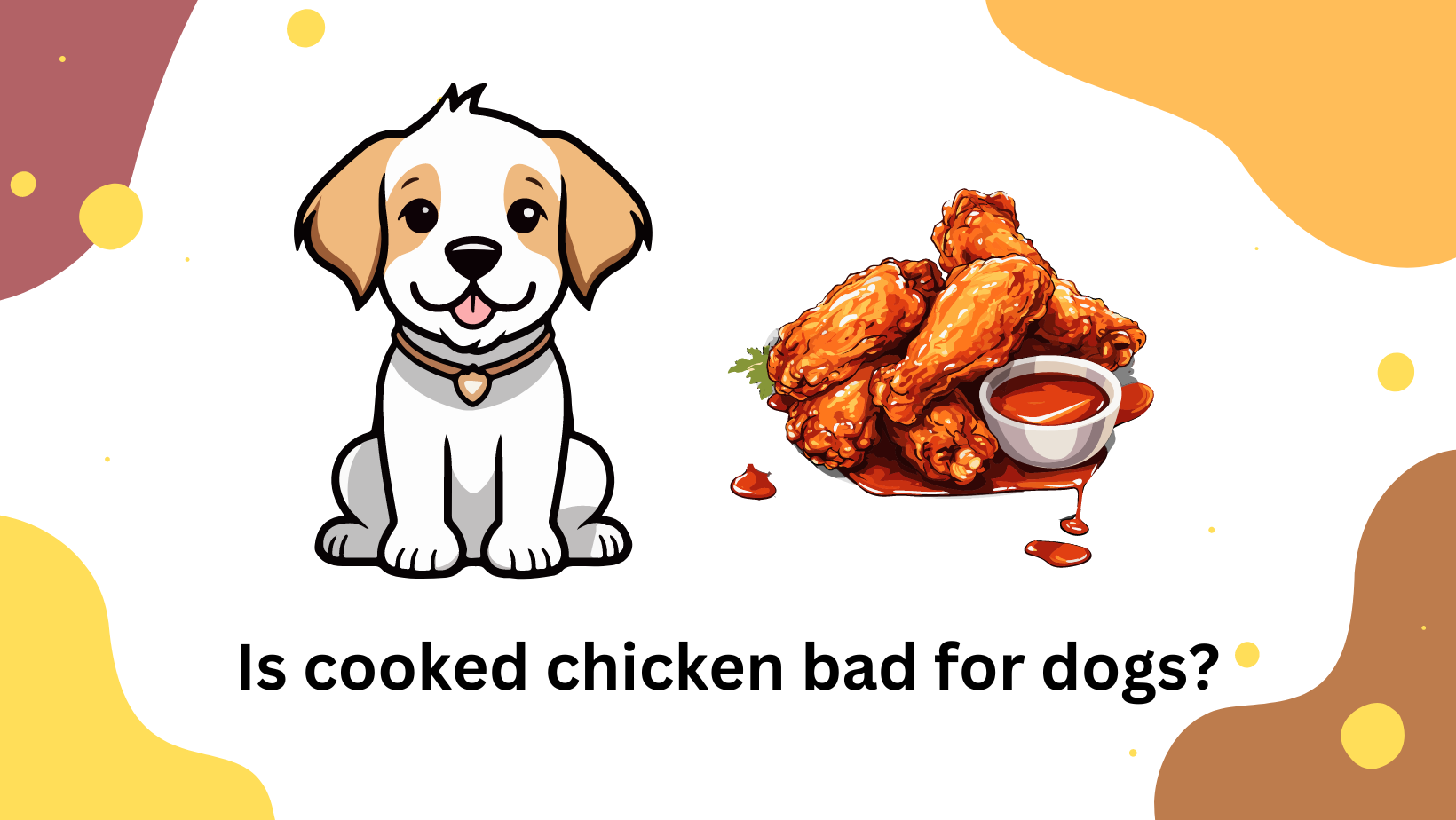As a loving dog owner, you want to make sure your pet gets the best nutrition possible.
When it comes to feeding them human foods, you might be wondering if cooked chicken is a safe option.
This long-form article dives deep into the subject, providing you with insights and advice on how to feed your dog cooked chicken safely. Let’s jump right in!
Is Cooked Chicken Bad for Dogs?
Cooked chicken can be a healthy addition to your dog’s diet, but there are some key considerations to keep in mind.
While plain cooked chicken can provide valuable protein and nutrients, certain cooking methods or seasonings can be harmful to your dog. Here’s what you need to know:
Potential Benefits of Cooked Chicken for Dogs
Cooked chicken offers several benefits for your furry friend:
- High Protein Content: Chicken is a great source of lean protein, which is essential for your dog’s muscle maintenance and overall health.
- Rich in Vitamins and Minerals: Cooked chicken contains important nutrients like vitamin B6, niacin, phosphorus, and selenium, which support your dog’s energy levels and overall well-being.
- Digestibility: Cooked chicken is generally easy for dogs to digest, making it a good option for dogs with sensitive stomachs.
Potential Risks of Cooked Chicken for Dogs
While cooked chicken can be beneficial, there are some risks to be aware of:
- Seasonings and Additives: If the chicken is seasoned with onions, garlic, or other harmful ingredients, it can be toxic to dogs.
- Bones: Cooked chicken bones can splinter and cause serious injuries in a dog’s digestive system. Always remove bones before feeding chicken to your dog.
- Fat Content: High-fat cuts of chicken or skin can lead to pancreatitis in dogs. Stick to lean cuts and avoid giving your dog chicken skin.
How to Safely Prepare Cooked Chicken for Dogs
To safely include cooked chicken in your dog’s diet, follow these guidelines:
- Choose Lean Cuts: Opt for skinless, boneless chicken breast or thigh meat to minimize fat content and avoid potential bone hazards.
- Cook Thoroughly: Make sure the chicken is cooked all the way through to eliminate any bacteria that could cause food poisoning.
- Avoid Seasonings: Stick to plain, unseasoned chicken to avoid harmful additives.
- Portion Control: Feed cooked chicken as a supplement to your dog’s regular diet, not as the main course.
- Monitor Your Dog’s Reaction: Observe your dog for any signs of digestive upset after introducing cooked chicken.
How Much Cooked Chicken Can Dogs Eat?
The amount of cooked chicken your dog can eat depends on their size and dietary needs:
- Small Dogs: Offer a small portion, around one to two tablespoons, as a treat or supplement.
- Medium Dogs: Serve a quarter cup of cooked chicken alongside their regular meals.
- Large Dogs: Provide up to half a cup of cooked chicken, depending on their size and dietary requirements.
Always consult your veterinarian for specific advice on portion sizes for your dog.
How Often Can Dogs Eat Cooked Chicken?
You can feed your dog cooked chicken in moderation. As a general rule, aim to offer it as an occasional treat or supplement to their regular meals, rather than as a staple in their diet.
Too much cooked chicken can lead to an unbalanced diet and potential health issues.
Cooked Chicken vs. Raw Chicken for Dogs
Cooked chicken is a safer option than raw chicken for dogs, as it eliminates the risk of bacterial contamination such as salmonella.
While some pet owners advocate for raw diets, cooking chicken thoroughly reduces the risk of foodborne illness.
Alternatives to Cooked Chicken
If you’re looking for alternatives to cooked chicken for your dog, consider these options:
- Lean Meats: Turkey and fish can also be good sources of protein for your dog.
- Commercial Dog Food: High-quality commercial dog food is formulated to meet your dog’s nutritional needs.
- Cooked Vegetables: Vegetables like carrots and green beans can be a healthy addition to your dog’s diet.
How to Introduce Cooked Chicken to Your Dog’s Diet
When introducing cooked chicken to your dog’s diet, do so gradually:
- Start Small: Begin with a small portion to see how your dog reacts.
- Monitor for Allergic Reactions: Watch for signs of allergies such as itching, hives, or gastrointestinal upset.
- Consult Your Veterinarian: If you have any concerns about your dog’s diet, consult your vet for guidance.
Signs of Chicken Allergy in Dogs
Though rare, some dogs may be allergic to chicken. Signs to watch for include:
- Itching: Excessive scratching or licking.
- Digestive Issues: Diarrhea or vomiting.
- Skin Irritations: Red, inflamed skin or rashes.
If you notice any of these symptoms, stop feeding your dog chicken and consult your veterinarian.
Homemade Dog Food Recipes with Cooked Chicken
For pet owners who enjoy preparing homemade meals, try these simple recipes with cooked chicken:
- Chicken and Rice: Combine cooked chicken with rice and a small portion of cooked vegetables for a balanced meal.
- Chicken and Sweet Potato: Mix cooked chicken with boiled sweet potatoes and a dash of fish oil for added omega-3s.
Remember to adjust portion sizes according to your dog’s size and dietary needs.
How Cooked Chicken Affects Dog Behavior
Cooked chicken can have a positive impact on your dog’s behavior when fed appropriately:
- Improved Energy Levels: The protein from cooked chicken can boost your dog’s energy.
- Mood Enhancement: Proper nutrition can improve your dog’s overall mood and temperament.
- Bonding Opportunities: Offering cooked chicken as a treat can strengthen the bond between you and your dog.
Cooked Chicken and Weight Management in Dogs
Cooked chicken can be part of a weight management plan for dogs:
- Lean Protein: Chicken is a lean source of protein, which can aid in weight loss or maintenance.
- Portion Control: Monitor the amount of cooked chicken your dog eats to avoid excess calorie intake.
Tips for Safely Feeding Cooked Chicken to Dogs
Follow these tips to ensure your dog enjoys cooked chicken safely:
- Remove Skin and Bones: Always take out bones and skin to prevent choking or digestive issues.
- Feed in Moderation: Offer cooked chicken as a treat or supplement, not as a primary food source.
- Combine with Other Foods: Mix cooked chicken with vegetables or grains for a balanced meal.
- Monitor Your Dog: Observe your dog’s reaction to cooked chicken and adjust their diet accordingly.
Understanding Dog Nutrition Needs
To provide the best diet for your dog, it’s important to understand their nutritional needs:
- Protein: Essential for muscle maintenance and growth.
- Fats: Provides energy and supports skin and coat health.
- Carbohydrates: Supplies energy and supports digestive health.
- Vitamins and Minerals: Vital for overall health and development.
Common Mistakes When Feeding Cooked Chicken to Dogs
Avoid these common mistakes when feeding your dog cooked chicken:
- Overfeeding: Offering too much cooked chicken can lead to an unbalanced diet.
- Using Seasonings: Seasoned chicken can be harmful to your dog.
- Feeding Chicken Bones: Cooked chicken bones can cause serious injuries.
How to Recognize Dog Food Intolerance
Recognizing food intolerance in your dog can help you adjust their diet:
- Digestive Issues: Diarrhea, vomiting, or gas.
- Skin Problems: Itchy skin, rashes, or hot spots.
- Behavioral Changes: Lethargy or irritability.
Cooked Chicken and Dog Health
Cooked chicken can play a role in your dog’s overall health:
- Supports Muscle Development: The protein in cooked chicken aids in muscle growth and repair.
- Boosts Immune System: Chicken contains nutrients that support your dog’s immune system.
- Promotes Healthy Coat: Cooked chicken provides fats that contribute to a shiny, healthy coat.
How to Safely Store Cooked Chicken for Dogs
Proper storage is key to ensuring the cooked chicken remains safe for your dog:
- Refrigerate Promptly: Store cooked chicken in the fridge within two hours of cooking.
- Use Airtight Containers: Keep cooked chicken in sealed containers to prevent contamination.
- Freeze for Longer Storage: Freeze cooked chicken in portions for up to three months.
Can Dogs Eat Cooked Chicken Skin?
It’s best to avoid feeding your dog cooked chicken skin:
- High Fat Content: Chicken skin is high in fat and can lead to digestive issues.
- Pancreatitis Risk: Consuming too much fat can cause pancreatitis in dogs.
- Choking Hazard: Chicken skin can be difficult for dogs to chew and digest.
How to Cook Chicken Safely for Dogs
When cooking chicken for your dog, follow these safety tips:
- Boil or Bake: Choose methods that cook chicken without adding extra fat or seasonings.
- Avoid Frying: Fried chicken can contain unhealthy fats and oils.
-
Cook Thoroughly: Ensure the chicken is cooked

